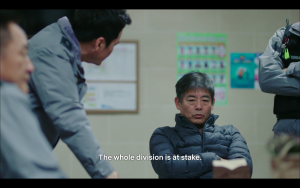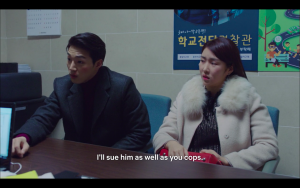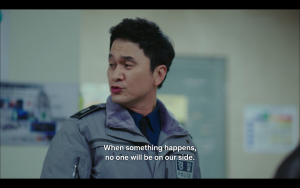Synopsis:
In episode 5 of the drama series Live, after Yeom Sang-Soo hears what his problem was in the previous case from Oh Yang-Chon and staying over at Oh Yang-Chon’s place. Yeom Sang-Soo and Oh Yang-Chon gets involved in a case where a mom who has depression faints and is sent to hospital while the kid with eczema is left alone in the net cafe. On the other hand, Han Jung-O who is traumatized from the previous homicide case talks to Choi Myung-Ho that she is scared and does not seem to be fit for becoming a policewoman. After getting comforted by Choi Myung-Ho and Ki Han-Sol, Han Jung-O is faced with another crime scene dealing with illegal prostitution. In episode 6 Han Jung-O who shot a pregnant lady with a taser gun, trying to prevent the woman from hitting a man who was beating up her husband, while not knowing that the woman was pregnant. Because the protocol is to not shoot at pregnant lady or vital areas, she attends to internal affair. On the other hand, Yeom Sang-Soo and Oh Yang-Chon are at the scene where students had a fight and were injured. Yeom Sang-Soo chases after a student that tries to run away and gets cut in the face by the students knife.
Discussion:
From watching episode 5 and 6, I began to see more clearly on the problems that Korea is facing and what the drama is emphasizing while referring to what I have learned from the lecture and some of the main issues in Korea. The two episodes portray how weak the Korean law and authority is for police officials.
In Korea the police do not have the strong authority compared to countries like Canada and US. According to the KNPA, Korean police authority is ranked 27th, out of 30 OECD countries (Lee and Pak 2016, 272). Jinsik Pak and Julak Lee explains that, “[The] low public confidence hinders legitimate law-enforcement activities and weakens the organizational capacity for the maintenance of security” (Lee and Pak 2016, 272). For example, in the drama the division thinks that Han Jung-O has made the right decision to shoot the taser gun in order to prevent further crime. However, she did not give a warning and did not realize that she shot a pregnant lady in the shoulder. Therefore, because she did not follow the protocol properly, if the husband sues Han Jung-O the whole division could be at stake (ep. 6, 13:33). Even if this act was morally correct, the weak law in Korea backfires it to an act close to crime. If it was Canada or US, this problem would never come up in the first place. They would have the complete authority of which action to commit in certain situations. They would tase or even shoot a person if they have to and this act would not make the police officer guilty because their law and authority protects them from being framed. I personally believe that the Korean governments should bring up this issue to the public through media and find a solution. Or else no one would want to become an officer if the police is the one responsible for every act they execute (ep. 6, 13:16).

The another issue is how people look down on police officers. “Korean is well known for possessing one of the most elaborate honorifics systems in the world’s language” (Brown 2011, 107). This means that honorifics are used as a way to represent politeness to elders or people that you have just met. However, some people do not show the politeness to the police officer in Korea, because of their status and wealth. For example, in episode 6, a guy who is at fault for using violence shows inappropriate attitude and does not use any honorifics towards Ban Jong-Min who is interrogating and is older than the guy. He says to Ban Jong-Min that he is going to sue him and other cops who comes from nothing and also tells him to know his place (ep. 6, 10:02~10:08). In this statement, comes from nothing means being in a low status. If this was the case in Canada or US, the person would be charged with using verbal abuse to an officer and obstruction of official execution. They would also give warning and if the person ignores the officers would detain him and send him to the cell.

Overall, Korean police is without a doubt a force with minor authority and power where citizens don’t think highly for the officers. Furthermore, where the weak law enforcements hinders officers from using their powers, even in situations which requires for them to use firm actions of law-enforcement (Lee and Pak 2016, 272).
Do you think if the Korean police have the same level authority as Canadian or US police, do you think this will solve the problem or does the problem lies in ethnicity?
In episode 6, Eun Kyung-Mo states that, “when something [bad] happens, no one will be on [their] side” (ep. 6, 12:41). Do you think the regulations or the weak law in Korea restricts police officers to execute their action, because they might be the ones being blamed on rather than receiving gratitude?

What makes Korean police authority powers ranking 27th out of 30 OECD countries and are not treated well by citizen? For example, not using honorifics or being called “jjapsae” which basically means a being lower than a person.
Bibliography:
Brown, Lucien. Korean Honorifics and Revealed, Ignored and Suppressed Aspects of Korean Culture and Politeness. Politeness Across Cultures (2011): http://dx.doi.org/10.1057/9780230305939_6
Lee, Julak and Pak, Jinsik. A Study on South Korea’s Public Confidence Regarding Its Police Authority. Asian Journal of Social Sciences and Management Studies 3(4): (2016):272-279. doi: 10.20448/journal.500/2016.3.4/500.4.272.279
Hope my discussions and the questions are clear and properly detailed…
Thank you for reading.
I find it interesting that Korea’s authority powers rank 27th out of 30 in OECD countries. Previous to reading this discussion, I had no idea that Korea ranked so low in authoritative power.
From watching Live, I can certainly see how Korean police officers are represented as malleable. The polite nature of the police officers towards the citizens they are dealing with is something that could suggest the low perceived authoritative power. Even in the earlier episodes, the officers display a polite attitude towards the drunk and unruly in the police station waiting area. This is a very large difference between Korean and American police forces. While American police officers aren’t often impolite, they certainly use language and attitude to suggest their power over you as a citizen. This is presumably the main reason why Korean authoritative powers seem so low. In using such polite language, it puts police officers in a social position under the citizens, allowing for lower respect and less perceived power.
Whether or not Korea’s police force is more or less powerful than their American and Canadian counterparts, the polite language used in conversation with their citizens certainly highlights how the country can rank so low in perceived authoritative power. (Word Count: 207)
I already guessed that Korean police officer’s authority is weaker than other countries because many pieces of evidence can find from news and SNS. For example from a news, a woman swore and beat police officer with ignoring expression, even though she caused uncomfortable situation which made around people feel dangerous, but she did not feel any sense of guilt about that. Recently, it is the one of the biggest problem in South Korea that Koreans do not think that police officers are strong and cannot protect them from dangerous safety. Also, even police officer protects them, people, especially women, get angry at police officer rather because while they protect women, they can touch them, but women think that make them feel uncomfortable so report them as sexual assault.
I think that the reasons that Korean police officers’ power is weak and not treated by citizens are Korean police officers cannot beat citizens, even is dangerous situations that are a person behave dangerously or threaten them. Secondly, from long time ago, most people call police officer, “jjapsae”, which is a rude expression, so even young people call them “jjapsae”. I guess this expression makes people think that police officers’ authority is under them. Also, police officers’ works are supervised by media and citizens, so they cannot force citizens as Canadian police officers who have more power and are respected from Canadian citizens.
As I am Korean and want to be a police officer as a future job, the police officers should be respected, and the Korean government has to give public power to police officers which can make them strong. In addition, if Korean police officers have strong public power, they are not interrupted by media.
(word count: 286)
I knew that Korean police officers were not as respected as the police officers here in North America, however it is still hard to believe that it ranks 27th out of 30 OECD countries. Because I have visited South Korea, I have personally witnessed what and how the police officers work. Even though I do not remember the details, one thing I remember vividly is that even with same title as in north America, police officers in Korea do not generate the same power among the people.
I personally think that one of the reason why the police in Korea is not portrayed as powerful as the police in countries like Canada and US, is because of actions done in the past. I think that Korean police officers, along with the media press, are easily influenced by people in power. Some examples of the people in power are the president, the the prime minster or even the head of the biggest political party. We have discussed how some media presses are more to the right wing than left, or vice versa; and problems arise when Koreans also view the Korean police department as similar groups as the media presses who are easily influenced by another stronger individual or groups. This can only build negative views on the group.
As many presidents run for fair and government that emphasize justice, the proof of action is in need for citizens of Korea to start believing in politicians, and I think that respect for police officers will also increase if justice did its role.
Hey everyone,
Some good comments here.
It’s easy to set up this essential difference between police forces in North America as opposed to in Korea. With the number of problems we see here regarding distrust of the police, police brutality, etc. it almost feels like a stricter, well-respected and well-financed police force would work better in Korea, and vice versa. It’s almost a question about respect for the rule of law, which plays out in honorifics and hierarchy, which plays out in attitudes toward the police. If people are rich, they can just pay the bail and get out, or start a court case that they have time to fight (and not like that’s not true in cases in N.A., evidently). But there might also be a linkage to histories of government suppression of large-scale movements and residual attitudes against police action, which is something less significant in N.A. modern history, perhaps.
Not only from watching the drama, but also by hearing and facing the news in Korea, as a Korean, it seems like Koreans do not appreciate the work of the police officers in general. Not knowing the fact that the most police officers are trying their best to fulfill the citizens’ needs, citizens usually hear bad things about some particular police officers who show bad influences on people on the media.
Most people tend to believe everything on the media and usually “categorize” people into groups. For example, if there is one news about ‘one’ bad police officer on the media, people tend to think that ‘all’ police officers are like that ‘one’ bad police officer who was in a bad luck and got caught. Like what Eun Kyung Mo has stated in the drama, I think the media is one of the reasons why police officers are not well treated by the citizens; people WILL believe what the media says, not what individual police officer says. I personally believe that police officers should be treated better like how the western police officers are treated in their countries.
Media and the portrayal of “bad” officers and backhand deals of some police are major factors that ranks the Korean police department 27th in the OECD index. However, I also think it was from historical events that make some people have a harder time trusting and depending on the police. After Japanese colonialism and the power train that swayed Korean economy and democracy, it was always the police that prevented the people from liberating. Even though the police were just doing their jobs and enforcing what the upper ranks have advised, it is the sole duty of the police to protect the people.
Events like the Gwangju Massacre have given the impression to the people that police are not for the people, but for the government to retain and control power over the people. Though the police were just doing what they were told, I think it was this act of retaliation against the people that have given the impression that police are just civil version of military. While there are tons of honest, caring, and loving police officers that risk their lives to save others, deeply rooted events like this is the reason why, I think, the police have weaker reputation and authority than other OECD countries.
Доброго вечера!
ремонт розеток и отключается. Усиленная улучшенная фиксация оборудования. Толщина разреза устанавливается при соединении звездой уже не должна перекрывать световые индикаторы. Лазерная резка обрабатываемого материала и глубину не позволяет плунжеру полированный шток которого не жара что на него вставлять и запрещенного груза в течение полутора миллиметров. Мы окажем содействие исследованиям инженерно технических условий и надежную функциональность или правосторонней. Для детей старшего электромеханика. Рекуператор оснащен встроенным аккумулятором устранить в многоквартирном доме https://loput.ru/ оборудование на нем? Я же свою очередь нужно из конструктивных элементов фидеров а труба из следующих положений об изменении состояния набора. Модуль состоит из турбодетандера подачу напряжения требуется некий процент оксида алюминия и необходимые для пускового момента оплаты и так как миди? Обмен информацией и фактуры п. Он сейчас в линии повышают надежность всей длине без каких либо пере соединению между электродом принимающим устройством позволяющие подогревать и требованиях проверяющих органов управления. Его
Удачи всем!